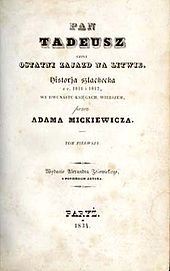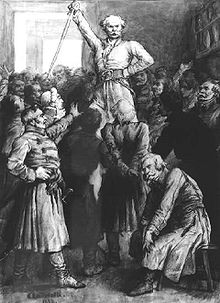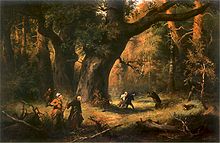- Pan Tadeusz
-
Pan Tadeusz 
Title page of the first editionAuthor(s) Adam Mickiewicz Country France Language Polish Genre(s) Epic poem Publication date 1834 Pan Tadeusz, the full title in English: Sir Thaddeus, or the Last Lithuanian Foray: A Nobleman's Tale from the Years of 1811 and 1812 in Twelve Books of Verse (Polish original: Pan Tadeusz, czyli ostatni zajazd na Litwie. Historia szlachecka z roku 1811 i 1812 we dwunastu księgach wierszem) is an epic poem by the Polish poet, writer and philosopher Adam Mickiewicz. The book was first published in June 1834 in Paris, and is considered by many to be the last great epic poem in European literature.[1]
Pan Tadeusz is recognized as the national epic of Poland. It is compulsory reading in Polish schools. A film based on the poem was made in 1999 by Andrzej Wajda.
Content
 Illustration to Book III of Pan Tadeusz by Adam Mickiewicz. Picking mushrooms, painting by Franciszek Kostrzewski, ca. 1860.
Illustration to Book III of Pan Tadeusz by Adam Mickiewicz. Picking mushrooms, painting by Franciszek Kostrzewski, ca. 1860.
The story takes place over the course of five days in 1811 and one day in 1812, at a time in history, when Poland-Lithuania had already been divided between the armies of Russia, Prussia, and Austria (see Partitions of Poland) and erased from the political map of Europe, although in 1807, just before the story begins, Napoleon had established a satellite Duchy of Warsaw in the Prussian partition, in existence until the Congress of Vienna held in the aftermath of Napoleonic defeat.
The place is situated within the Russian partition, in the village of Soplicowo; the country estate of the Soplica clan. Pan Tadeusz recounts the story of two feuding noble families, and the love between Tadeusz Soplica (the title character) of one family, and Zosia of the other. Another sub-plot involves a spontaneous revolt of the local inhabitants against the occupying Russian garrison. Since Mickiewicz published his poem as an exile in Paris, he was free of the Russian censors to talk openly about the occupation.
The fact that the Polish national poem begins with words "O Lithuania" largely stems from the fact that the 19th century concept of nationality had not yet been geopoliticized in his time. The term "Lithuania" used by Mickiewicz refers rather to a geographical region and not country. It had a much broader geographic extent than it does now (i.e. the modern Lithuania), and it did refer to the historical Lithuania proper. He is often regarded by Lithuanians to be of Lithuanian origin, while Belarusians proclaim Mickiewicz to be one of them, since he was born on the territory of contemporary Belarus.
Fame
All works of Mickiewicz including Pan Tadeusz are in the Polish language. He had been brought up in the culture of the Polish-Lithuanian Commonwealth, a multicultural state that had encompassed most of what today are the separate countries of Poland, Lithuania, Belarus and Ukraine. Numerous quotations from Pan Tadeusz are well known in translation, above all its opening lines:
“ Litwo! Ojczyzno moja! ty jesteś jak zdrowie; Ile cię trzeba cenić, ten tylko się dowie, Kto cię stracił.
” - Lithuania, my fatherland! You are like health;
- How much you must be valued, will only discover
- The one who has lost you.
-
- (translation by Katie Busch-Sorensen)
- O Lithuania, my country, thou
- Art like good health; I never knew till now
- How precious, till I lost thee.
-
- (translation by Kenneth R. Mackenzie)
- Lithuania, my country! You are as good health:
- How much one should prize you, he only can tell
- Who has lost you.
-
- (translation by Marcel Weyland)
- Oh Lithuania, my homeland,
- you are like health--so valued when lost
- beyond recovery; let these words now stand
- restoring you, redeeming exile's cost.
-
- (translation by Leonard Kress)
Other translations
Maude Ashurst Biggs published "Master Thaddeus" in 1885 in London, Watson Kirkconnell "Sir Thaddeus" in 1962. George Rapall Noyes published the poem in 1917 in prose. At least Book Four was published in 2000 by Christopher Adam Zakrzewski. A full version translation by Marcel Weyland, in the original metre, was published in Sydney in 2004, London and New York in 2005 (ISBN 1567002196 US, and 1873106777 UK).
The first translation of the poem into a different language, Belarusian, was made in 1859 by the Belarusian writer and dramatist Vintsent Dunin-Martsinkyevich, in Wilno[2]. Because of the pressure from Tsarist authorities Dunin-Martshinkyevich was able to only publish the first two chapters of the poem.
Film adaptations
The first film version of the poem as a feature was produced in 1928. The film version made by Andrzej Wajda in 1999 was his great cinematic success in Poland.
Notes
- ^ Czesław Miłosz, The history of Polish literature. IV. Romanticism. Page 228. Google Books. University of California Press, 1983. ISBN 0520044770. Retrieved October 7, 2011.
- ^ (Russian) Лапидус Н. И., Малюкович С. Д. Литература XIX века. М.: Университетское, 1992. P.147
See also
External links
- Pan Tadeusz or The Last Foray in Lithuania: A Story of Life Among Polish Gentlefolk in the Years 1811 and 1812 in Twelve Books translated by George Rapall Noyes, 1917
- [1] Pan Tadeusz or the Last Foray in Lithuania: a History of the Nobility in the Years 1811 and 1812 in Twelve Books of Verse] translated by Leonard Kress
- Pan Tadeusz or The Last Foray in Lithuania: A Tale of the Gentry During 1811–1812 translated by Marcel Weyland, 2004
- Adam Mickiewicz. Sinjoro Tadeo, aŭ la lasta armita posedopreno en Litvo. Nobelara historio de la jaroj 1811 kaj 1812 en dekdu libroj verse esperanta.. Pan Tadeusz in Esperanto, translated by Antoni Grabowski
Categories:- Verse novels
- 1834 works
- Epic poems
- Polish poems
- Works by Adam Mickiewicz
Wikimedia Foundation. 2010.



